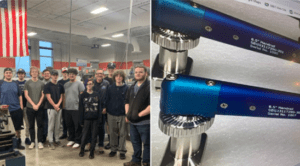 As hard as it is to believe, another year is coming to an end. This was certainly another strange year, but the in-person conferences I usually look forward to were a mixed bag this year. I attended my first in-person conferences and attended a number of virtual ones as well. And the jury is still out on what 2023 will hold. More importantly, today marks the last news round-up of the year. I always find the news round-up exciting to write, as I end up reading more about supply chain and logistics than I would have thought possible. All of us at Logistics Viewpoints would like to thank our readers for continuing to tune in every week. We’d also like to thank all our sponsors for their continued support. Without our readers and sponsors, Logistics Viewpoints would not be possible. So, a big thank you from all of us, and we hope you all have a wonderful holiday season. And now on to this week’s logistics news.
As hard as it is to believe, another year is coming to an end. This was certainly another strange year, but the in-person conferences I usually look forward to were a mixed bag this year. I attended my first in-person conferences and attended a number of virtual ones as well. And the jury is still out on what 2023 will hold. More importantly, today marks the last news round-up of the year. I always find the news round-up exciting to write, as I end up reading more about supply chain and logistics than I would have thought possible. All of us at Logistics Viewpoints would like to thank our readers for continuing to tune in every week. We’d also like to thank all our sponsors for their continued support. Without our readers and sponsors, Logistics Viewpoints would not be possible. So, a big thank you from all of us, and we hope you all have a wonderful holiday season. And now on to this week’s logistics news.
- Bipartisan lawmakers unveiling bill targeting supply chain shortfalls
- Amazon’s plan to kill the barcode
- FedEx expands no-box, no-label returns program
- Fairport students among high schoolers machining parts for NASA
- Forecasts call for freight rate slumps in 2023
- Logistics improvements boost Chewy’s profits
- Del Monte launches first carbon-neutral certified pineapple
 Sen. Marco Rubio (R-Fla.) and Rep. Ro Khanna (D-Calif.) introduced legislation on Tuesday to require federal agencies to address supply chain issues as the country fights the lingering effects of the coronavirus pandemic. The legislation, which is entitled the National Development Strategy and Coordination Act of 2022, would require Cabinet-level agencies to identify weaknesses in supply chains that could impact national security and domestic manufacturing. The heads of these agencies would also need to periodically recommend ways for their departments to attract private investment and change federal financing programs to advance economic development. The legislation would give the Treasury Department’s Federal Financing Bank $20 billion to be invested over the course of 10 years to take action on the recommendations using loan guarantees, issuing securities-backed financing or purchasing debt.
Sen. Marco Rubio (R-Fla.) and Rep. Ro Khanna (D-Calif.) introduced legislation on Tuesday to require federal agencies to address supply chain issues as the country fights the lingering effects of the coronavirus pandemic. The legislation, which is entitled the National Development Strategy and Coordination Act of 2022, would require Cabinet-level agencies to identify weaknesses in supply chains that could impact national security and domestic manufacturing. The heads of these agencies would also need to periodically recommend ways for their departments to attract private investment and change federal financing programs to advance economic development. The legislation would give the Treasury Department’s Federal Financing Bank $20 billion to be invested over the course of 10 years to take action on the recommendations using loan guarantees, issuing securities-backed financing or purchasing debt.
 Robots may be the future, but robotic arms are apparently no good at using an old, steadfast form of technology: the barcode. Barcodes can be hard to find and can be affixed to oddly shaped products, something robots can’t troubleshoot very well. As a result, Amazon said Friday that it has a plan to kill the barcode. Using pictures of items in Amazon warehouses and training a computer model, the e-commerce giant has developed a camera system that can monitor items flowing one-by-one down conveyor belts to make sure they match their images. Eventually, Amazon’s AI experts and roboticists want to combine the technology with robots that identify items while picking them up and turning them around.
Robots may be the future, but robotic arms are apparently no good at using an old, steadfast form of technology: the barcode. Barcodes can be hard to find and can be affixed to oddly shaped products, something robots can’t troubleshoot very well. As a result, Amazon said Friday that it has a plan to kill the barcode. Using pictures of items in Amazon warehouses and training a computer model, the e-commerce giant has developed a camera system that can monitor items flowing one-by-one down conveyor belts to make sure they match their images. Eventually, Amazon’s AI experts and roboticists want to combine the technology with robots that identify items while picking them up and turning them around.
 The FedEx program will accept unboxed, unlabeled returns, then consolidate returned items and ship them back to merchants. FedEx Corp. said Monday it will launch a parcel returns consolidation program that will allow returned items to be dropped off without the products being boxed or labeled. Under the program, FedEx Consolidated Returns, consumers can bring returned items with a QR code to any of the 2,000 locations operated by FedEx Office, the company’s storefront retail operation. At each location, FedEx will consolidate and process volumes of returns from multiple merchants. From there, the returns will be delivered to their origin locations using less-than-truckload services.
The FedEx program will accept unboxed, unlabeled returns, then consolidate returned items and ship them back to merchants. FedEx Corp. said Monday it will launch a parcel returns consolidation program that will allow returned items to be dropped off without the products being boxed or labeled. Under the program, FedEx Consolidated Returns, consumers can bring returned items with a QR code to any of the 2,000 locations operated by FedEx Office, the company’s storefront retail operation. At each location, FedEx will consolidate and process volumes of returns from multiple merchants. From there, the returns will be delivered to their origin locations using less-than-truckload services.
 It is absolutely amazing the things can be learned in high school these days. In one Fairport classroom at the Eastern Monroe Career Center, and other classrooms across the country, machining students are forging precision parts for NASA. Senior Isaiah Saunders-Brevner and his manufacturing and machining classmates are going to space, sort of. They are fabricating 30 pieces for handles that will be installed inside the International Space Station to help the astronauts. The hardware made by high school students to support NASA is part of the NASA HUNCH program with 277 schools in 44 states. The pieces will take the students most of the school year to complete. The NASA HUNCH mission is to empower and inspire students. The program is looking to expand to more high schools. If your school is interested in joining the program, you can apply online at nasahunch.com.
It is absolutely amazing the things can be learned in high school these days. In one Fairport classroom at the Eastern Monroe Career Center, and other classrooms across the country, machining students are forging precision parts for NASA. Senior Isaiah Saunders-Brevner and his manufacturing and machining classmates are going to space, sort of. They are fabricating 30 pieces for handles that will be installed inside the International Space Station to help the astronauts. The hardware made by high school students to support NASA is part of the NASA HUNCH program with 277 schools in 44 states. The pieces will take the students most of the school year to complete. The NASA HUNCH mission is to empower and inspire students. The program is looking to expand to more high schools. If your school is interested in joining the program, you can apply online at nasahunch.com.
 Freight rates on sea, air, and highway routes are on track to drop from their pandemic highpoints during 2023, according to a trio of forecasts released this week. Those three forecasts match an industry-wide report released on Tuesday that found a “severe rate of contraction” in transportation prices measured in November, according to the Logistics Managers’ Index (LMI). If that trend continues as forecast, it would follow months of tight capacity and high rates in many transportation modes. On the water, ocean freight carriers set exceptionally high container rates during 2022. But towards the latter half of the year, those prices started to plummet, and they will likely continue to crash as we transition into the new year, according to a market forecast from Container xChange, a German container logistics platform.
Freight rates on sea, air, and highway routes are on track to drop from their pandemic highpoints during 2023, according to a trio of forecasts released this week. Those three forecasts match an industry-wide report released on Tuesday that found a “severe rate of contraction” in transportation prices measured in November, according to the Logistics Managers’ Index (LMI). If that trend continues as forecast, it would follow months of tight capacity and high rates in many transportation modes. On the water, ocean freight carriers set exceptionally high container rates during 2022. But towards the latter half of the year, those prices started to plummet, and they will likely continue to crash as we transition into the new year, according to a market forecast from Container xChange, a German container logistics platform.
 Online pet retailer Chewy said its third quarter results show investments it made in fulfillment and logistics are paying off. Chewy surprised analysts, who had been expecting a loss for the quarter, by posting net income of $2.3 million, and earnings per share of 1 cent. The retailer also beat expectations for revenue, posting net sales of $2.53 billion for the quarter, up 14.5 percent over the third quarter of 2021. Chewy is showing that it is able to combine its image as a warm and fuzzy, feel-good company that understands pet lovers, with hard-nosed business decisions that cut costs and give it an edge in the competitive pet space. But while analysts on the earnings call praised Chewy for its performance during the quarter, investors didn’t immediately reward Chewy for the positive results. Chewy’s stock, which closed up 1.79 percent at $41.97, was down more than 2 percent in after-hours trading.
Online pet retailer Chewy said its third quarter results show investments it made in fulfillment and logistics are paying off. Chewy surprised analysts, who had been expecting a loss for the quarter, by posting net income of $2.3 million, and earnings per share of 1 cent. The retailer also beat expectations for revenue, posting net sales of $2.53 billion for the quarter, up 14.5 percent over the third quarter of 2021. Chewy is showing that it is able to combine its image as a warm and fuzzy, feel-good company that understands pet lovers, with hard-nosed business decisions that cut costs and give it an edge in the competitive pet space. But while analysts on the earnings call praised Chewy for its performance during the quarter, investors didn’t immediately reward Chewy for the positive results. Chewy’s stock, which closed up 1.79 percent at $41.97, was down more than 2 percent in after-hours trading.
 A unique, limited-availability tropical fruit offering is getting ready to hit the market. Fresh Del Monte Produce has pulled back the curtain on the upcoming launch of its new Del Monte Zero™ Pineapple, an exciting extension of its lineup of Del Monte Gold®, HoneyGlow®, and Del Monte “The Original” pineapple varieties. According to a press release, the Zero pineapple is the company’s first carbon-neutral certified pineapple, which factors in the entire supply chain from farm to table in its North American and select European markets. Grown in Costa Rica and certified as sustainably grown by third-party certification body SCS Global Services, the limited-availability pineapple will be available to North American and select European consumers in early 2023.
A unique, limited-availability tropical fruit offering is getting ready to hit the market. Fresh Del Monte Produce has pulled back the curtain on the upcoming launch of its new Del Monte Zero™ Pineapple, an exciting extension of its lineup of Del Monte Gold®, HoneyGlow®, and Del Monte “The Original” pineapple varieties. According to a press release, the Zero pineapple is the company’s first carbon-neutral certified pineapple, which factors in the entire supply chain from farm to table in its North American and select European markets. Grown in Costa Rica and certified as sustainably grown by third-party certification body SCS Global Services, the limited-availability pineapple will be available to North American and select European consumers in early 2023.
That’s all for this week. Enjoy the weekend, the upcoming holidays, and the song of the week, which always puts the holiday season in my heart, Christmas Eve / Sarajevo by the Trans-Siberian Orchestra.

















